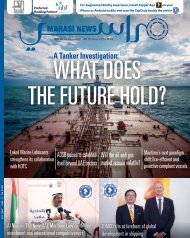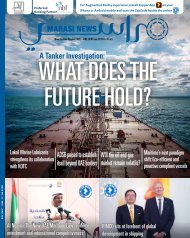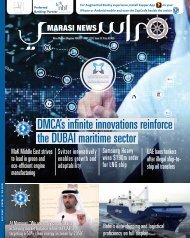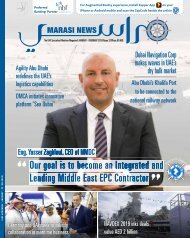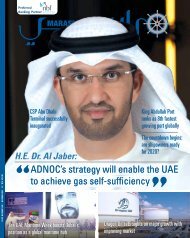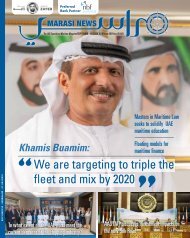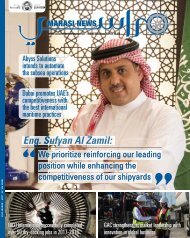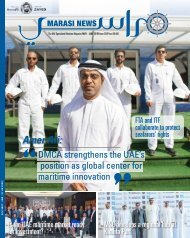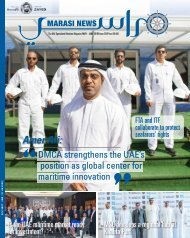Marasi 28
Create successful ePaper yourself
Turn your PDF publications into a flip-book with our unique Google optimized e-Paper software.
LEGAL REPORT<br />
Will the new UAE<br />
Maritime Law serve<br />
Shipowners?<br />
By Jasamin Fichte<br />
Managing Partner, Fichte & Co<br />
Geographically, as being in the centre of the World, the<br />
UAE is arguably an “ideal” Maritime location. As a gateway<br />
to Europe and America from the Fareast, one of the largest<br />
Ports in the World, state of the art warehousing facilities<br />
and a tax free nation – UAE has much to offer to be<br />
a Maritime hub. However, limi-tations within the Law have<br />
hindered development in the Maritime field where not<br />
only has the industry remained under-developed but has<br />
seen many a Shipowner, despite the immense possibilities<br />
the nation has to offer, shy away from it. A Maritime<br />
Law, enacted in 1981 and amended in 1988 in today’s<br />
age, re-mains ineffective and short of answering many issues<br />
a developed Maritime nation is required to offer. A<br />
hindrance which is required to be immediately addressed<br />
should UAE desire to remain in the league of Maritime<br />
nations with a thriving Maritime industry.<br />
Key issues to be addressed<br />
Most shipowners deploy international crew and officers<br />
to man their vessels. This requirement could vary<br />
depending on the flag state requirements, trading patterns,<br />
technical requirements and various other factors.<br />
In general deployment of seafarers require them to have<br />
a “continuous discharge certifi-cate” (CDC) and in some<br />
cases a “seafarers visa” when joining a ship. Seafarers joining<br />
a UAE flagged vessel are required to have a UAE visa,<br />
an employment visa with a validity of 2 years together<br />
with a local medi-cal insurance as a requirement as per<br />
local immigration laws. This alone is a hindrance to ship<br />
operations as seafarer contracts rarely exceed a period of<br />
12 months today. The shipowner of a UAE flagged vessel<br />
is therefore not only faced with dealing with immigration<br />
formalities but also added manning expenses. In addition,<br />
a Shipowner also has to spend twice on medical insurances<br />
for his crew and officers which are covered under<br />
the P&I (Protection and Indemnity) Insurance policy, unrecognized<br />
by the local immigra-tion authorities.<br />
Every contractual agreement, due to various reasons<br />
can always lead to a dispute. A complexity of a Mar-itime<br />
contract which not only has involvement of various parties<br />
is also dependent on multiple tech-nical issues. This<br />
“techno-commercial” contract together with the complexities<br />
of trading requirements is always in English. A<br />
translation of documents into Arabic, a pre-requisite for<br />
UAE Courts, can result in a “loss in translation” thereby<br />
defeating the purpose of resolving a dispute. It is therefore,<br />
fundamental that all Maritime matters be addressed<br />
in English and probably a separate Maritime Court be set<br />
up in either DIFC or ADGM where cases are addressed in<br />
English. This will not only add a comfort factor to a shipowner<br />
but also ensure that translation is not the Achilles<br />
Heel for a Maritime dispute.<br />
68 MAY - JUNE 2018







